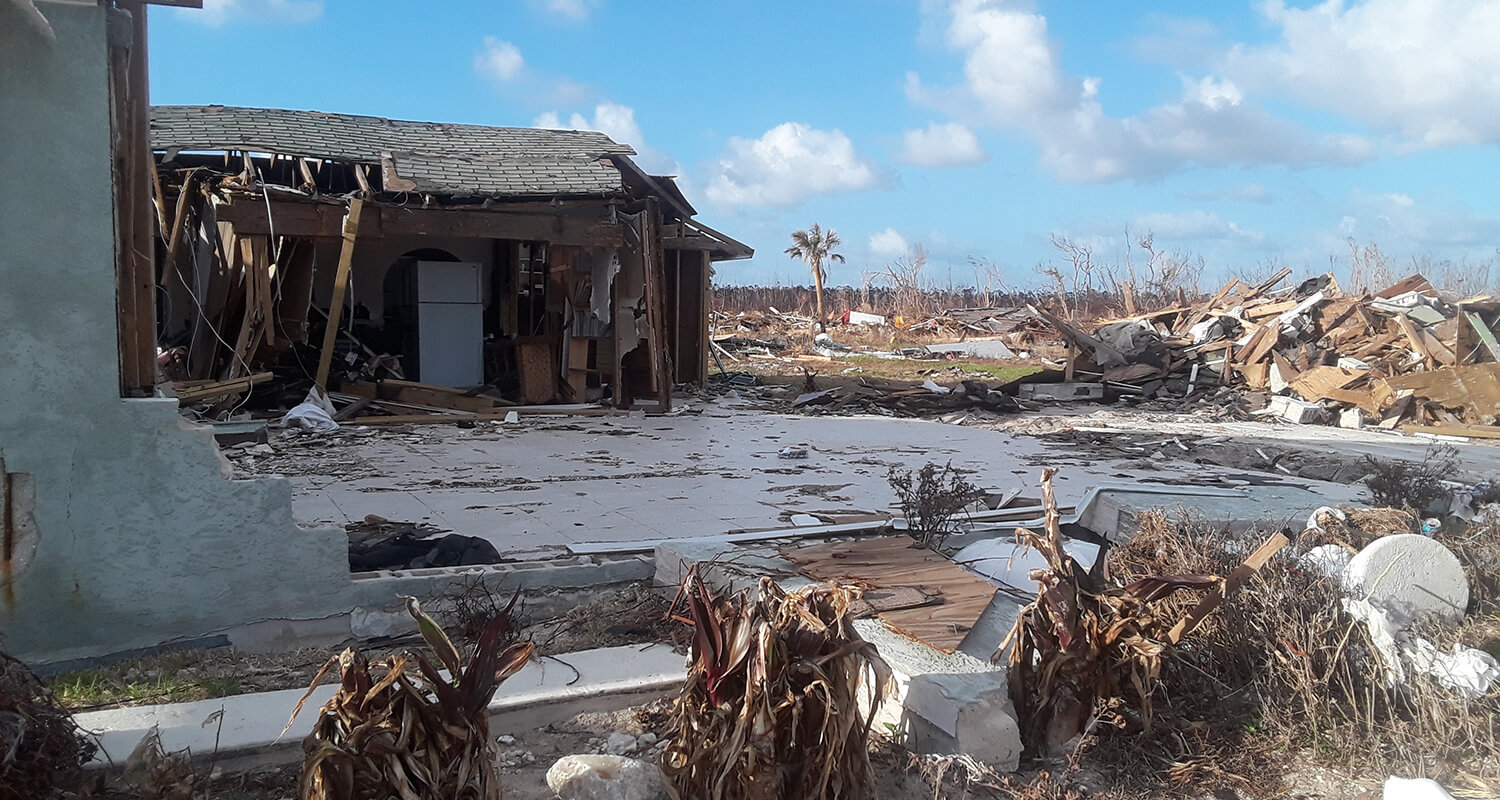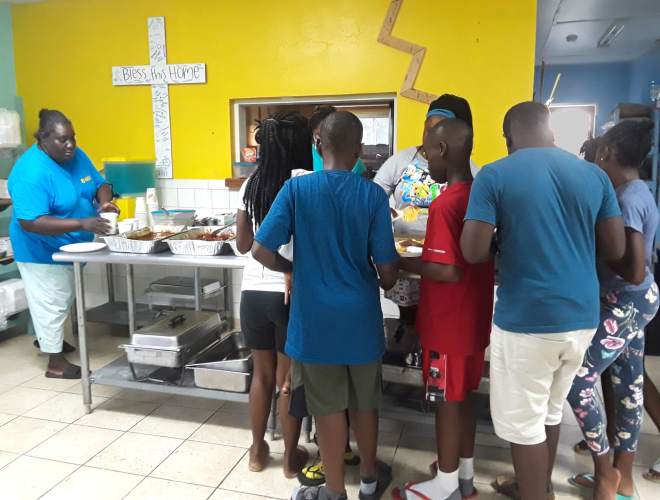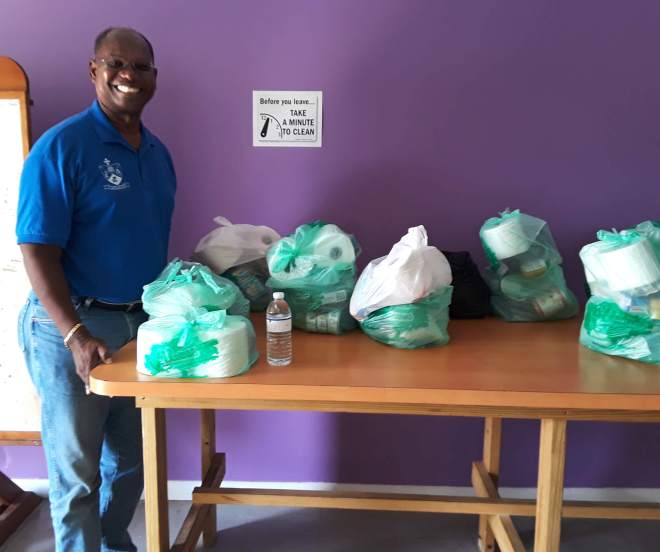
By Katie Hills Uzoka
October 11, 2019 | ATLANTA
As Category 5 Hurricane Dorian hit the Bahamian islands of Grand Bahama and Abaco in early September, extreme winds, storm surges, flooding and record-setting rain left a trail of devastation.
The death toll is now more than 60, but with many people still unaccounted for, the number is expected to rise. The United Nations estimates 76,000 people have been left homeless as a result of the hurricane.
In response to the need for emergency relief, the United Methodist Committee on Relief (UMCOR) awarded solidarity grants to partners Bahamas Methodist Habitat (BMH), a nonprofit outreach ministry of the Bahamas Conference of the Methodist Church (BCMC), and the Bahamas Turks and Caicos Island Conference (BTCIC) of the Methodist Church in the Caribbean and the Americas (MCCA).
A storm-battered community rebounds
On Sept. 6, Camp Symonette on the island of Eleuthera was activated as a shelter for hurricane evacuees. The camp is home to BMH and dedicated to disaster relief and home repair.
BMH director, the Rev. Stephanie Gottschalk, BMH staff and volunteers got to work readying dormitories and preparing for the intake of evacuees. Initially BMH received 32 evacuees; they’ve since served 76. All relocated from Abaco, where destruction was extreme and comprehensive.

PHOTO: KATIE HILLS UZOKA
With funds from UMCOR, Gottschalk plans to cover utilities for Camp Symonette and provide stipends to volunteer shelter workers to compensate them for their committed efforts. She also plans to apply UMCOR funds to administrative support to process both generous donations and volunteer offers that have come from friends of BCMC/BMH.
For those who normally work at BMH, it is not business as usual, which generally entails logistical and project coordination for U.S.-based Volunteers in Mission (VIM) teams who deploy to Eleuthera and other island sites for short-term projects. Managing the day-to-day needs of hurricane survivors of various ages and cultural and linguistic backgrounds is challenging, yet vital, work. Many lost neighbors, friends or family in the hurricane and are still processing the traumatic experience.
Evacuees were frightened and agitated when Tropical Storm Humberto struck the Bahamas two weeks after Hurricane Dorian. “When we had the heavy rain and wind, they started to panic, some became depressed, almost angry,” reported a BMH volunteer named Denise. Many had lost their appetite and seemed dejected; no one was playing dominoes together in the evenings as they once had.
In the week that followed, Denise had an idea to promote cohesion and harmony in the group. With the help of shelter residents, she rearranged the dining hall into long communal tables and placed flowers on each for a special touch at dinner. Following the meal, some of the young women led the group in an English-Creole singalong accompanied by guitar. Denise looked for small indications that her efforts had paid off: smiling faces and a game of dominoes after dinner. “I’ve never been so happy to hear dominoes in all my life,” she sighed.
UMCOR plans to continue its work with Gottschalk on a proposal for further support of the evacuee shelter, including operation and transitional services for residents when the shelter demobilizes. BCMC is also committed to assisting on the island of Abaco and deployed an assessment team on October 10 to get a better understanding of needs.
Given BMH’s established reputation in disaster relief and home repair, its leadership, led by BCMC president, Carla Culmer, is poised to participate in hurricane-resistant rebuilding in the wake of Hurricane Dorian. This storm has been a drastic reminder that the next storm is always on the horizon and preparedness is a critical part of disaster work.
Fundamental needs still being addressed on Grand Bahama Island
On Grand Bahama Island, the communities of High Rock, Freetown, Pelican Point and McClean’s Town were among those that experienced the most widespread structural damage from Dorian. An oil storage facility in East Grand Bahama was compromised, leaking 1.5 million gallons of crude oil into the surrounding area.

PHOTO: KATIE HILLS UZOKA
While many residents evacuated, others stayed and are now cleaning up their homes, piling water-damaged furniture, drywall and personal effects on the road for disposal. Since there are no longer active evacuee shelters in Grand Bahama, some are living in tents next to their destroyed homes.
For those who remain in Freeport, the Rev. Kenneth Lewis’ food relief program, run from St. Paul’s Methodist Church, is a lifeline.
Lewis is superintendent to three congregations, two of which suffered damage during Hurricane Dorian. From the kitchen and community meeting room of St. Paul’s, Lewis operates the BTCIC/MCCA command center for storm response. Seven hundred and fifty meals per day are served in addition to “care packages” of groceries and hygiene items that are picked up by community members as needed. Diapers, drinking water and water filters are provided as well. UMCOR grants have supported the purchase and shipment of essential supplies to Freeport to serve the community.
Alberta, a volunteer in charge of the kitchen at St. Paul’s, is also a survivor of the storm. Her home in Central Grand Bahama had never flooded. But during Hurricane Dorian, the water level rose extremely fast. She ran out and flagged down a car to take her relatives to safety, then returned to her home to salvage what she could. She climbed on top of a table, then a ladder, to wait out the storm. When the water finally receded, “everything that was low was lost, and we have to cut out all the drywall up to four to five feet,” she said.
Despite the massive disaster recovery project Alberta and her family now face, she takes great joy in serving her community with essentials to meet their basic needs.
Lewis, with the administrative, logistical and material support of BTCIC Bishop Theophilus Rolle and the conference disaster team, is poised to provide ongoing relief support to the hurricane-affected community in Grand Bahama. UMCOR is working with the conference disaster team on relief project design, including the possibility of providing food, hygiene kits or essential nonfood items to disaster-affected households.
For Lewis, the requests keep coming in. Next week, BTCIC/MCCA will partner with Freeport public schools to provide two meals per day for 600 students. The spirit of resilience and camaraderie is evident in the way residents of Grand Bahama Island are banding together.
UMCOR is committed to working with both Methodist partners in the Bahamas to respond to the humanitarian need caused by Hurricane Dorian. UMCOR International Disaster Response will continue to work to support the needs of disaster-affected people through each phase of the disaster cycle: relief, recovery, mitigation and preparedness.
Katie Hills Uzoka is the program manager for UMCOR’s International Disaster Response unit. She visited the Bahamas in late September to help determine the best ways UMCOR can partner in relief and recovery efforts.

